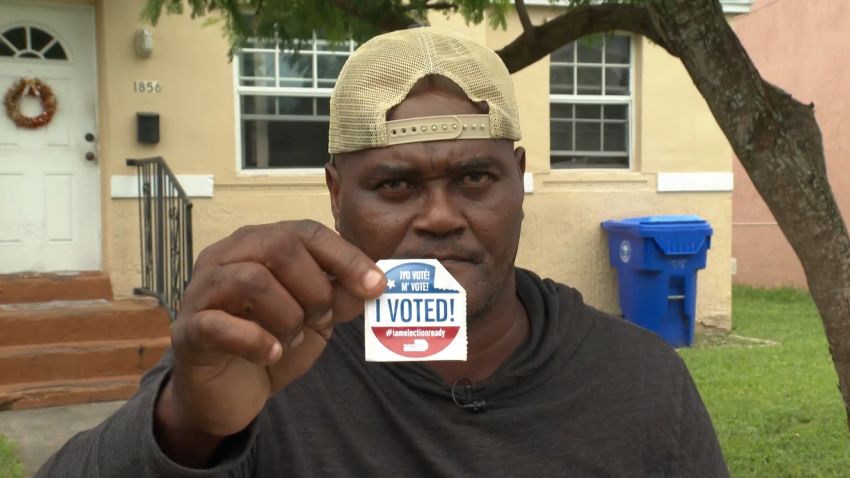Editor’s Note: Van Jones is a CNN host and political commentator and the founder of Dream.org. Janos Marton, an organizer and civil rights attorney, is the national director of Dream.org. The views expressed in this commentary are the authors’. View more opinion at CNN.
The arresting police officers sounded almost apologetic as they detained the suspect in front of his home in Tampa, Florida.


The detained man, Tony Patterson, was shown handcuffed and placed in a squad car, in images from a recently-released body cam recording seen around the country.
“Why would you all let me vote if I wasn’t able to vote?” Patterson ask one officer in seeming disbelief.
Arrests like these are the latest act of political theater staged by Gov. Ron DeSantis – and one in which officers of the law are used as props, as are the unsuspecting Florida residents discovering in the most dismaying way imaginable that the act of vote has been denied them.
It is all part of a desperate effort to prove Republican claims of voter fraud. But while claims of widespread voter fraud in Florida are fake, the impact of these arrests on the lives of these citizens is real, tragic and profound.
In 2018, Floridians overwhelmingly voted to amend the state constitution and restore voting rights to those with convictions who had already served their time. The measure, dubbed Amendment 4, was to have been the largest expansion of voting rights since the 1965 Voting Rights Act.
The thinking behind the measure, led by the Florida Rights Restoration Coalition (which is also supporting the legal defense of the arrested individuals), is that the best way to set someone up for success after they’ve been incarcerated is to allow them to reenter society and participate in one of the most cherished activities of US citizenship.
But soon after Florida’s Amendment 4 measure passed, DeSantis and Republican members of the state legislature worked aggressively to undermine the will of the voters. The legislature passed, and the governor signed, a measure barring the vote to Floridians with any outstanding fines that had been levied in connection with a felony conviction.
The bill disqualified some people from voting after they served their time – but the state didn’t tell these folks about their ineligibility.
The new law made it nearly impossible for those with felony convictions to vote and placed them behind a laborious bureaucratic maze. Why? To sustain one of the most potent, racist forms of voter suppression in the United States. According to The Sentencing Project, one in every 16 Black adults across the country is disenfranchised. In Florida, that figure is one in seven Black adults. This bill would ensure we keep it that way.
The police body cam images showing people confused and upset over their arrests was released earlier this week by the Tampa Bay Times, which obtained them through public records requests.
The disenfranchised included Michelle Stribling, a 52-year old Black woman who believed her rights had been restored because she was issued a voter registration card. She voted in the 2020 election in Orange County via mail-in ballot and now faces two felony counts for having voted, charges punishable by up to five years in prison.
Leo Grant Jr., a 55-year-old Black man, told officials he voted by mail after election administrators sent him a voter ID card. He too was bewildered over how he could be accused of fraud when the government told him he could vote.
Stribling and Grant were among 20 people arrested as part of DeSantis’ crackdown in Florida and charged with voter fraud. They now face new felony charges, fines of up to $5,000 fines and a possible return to prison if they are convicted. (One man, who was among the 20 arrested, had his charges dismissed Friday on the grounds that the prosecutor lacked jurisdiction to bring them.) Their second chance is being taken away from them simply because they participated in our democracy.
DeSantis announced the arrests at a press conference in August, but they became a national news story after the body cam footage was released showing the incredulous faces and plaintive voices of Floridians who were having their freedom taken away again.
“They do not have the right to vote,” DeSantis said during the event. “And now they’re going to have to pay the price for it.”
It’s clear that the individuals arrested for voter fraud most likely did not know they were not eligible to vote; DeSantis’ own administration appears to have approved their voter registration applications. It was the state’s responsibility to inform them that they were legally barred from voting. Instead, the state used their desire to participate in democracy as an excuse to put them back behind bars.
It’s worth noting that these cases are being treated drastically differently than those in Florida who have faced similar charges in the past.
In 2021, four residents of The Villages, a predominantly White, Republican community, were arrested for double voting in the 2020 election. They had voted in Florida and another state. Two of the defendants were allowed to turn themselves in. Three accepted pretrial intervention deals requiring that they perform community service and earn at least a C in a civics class.
Florida’s governor showed his desperation for attention and desire for headlines, but this is bigger than one election, campaign or political party. The United States was founded on the principles of freedom and democracy. The right to vote is one of those principles. Voting is a cornerstone of American values and cherished way of life. We dream of a country that makes democracy work for all of us.
The arrests of formerly convicted people do not strengthen our democracy or protect our communities. They are a political stunt with real world consequences.
America should be more than the country with the highest incarceration rate in the world. Ours should be a country of second chances. Attaining that goal requires leaders who view formerly incarcerated people as people, not props.






